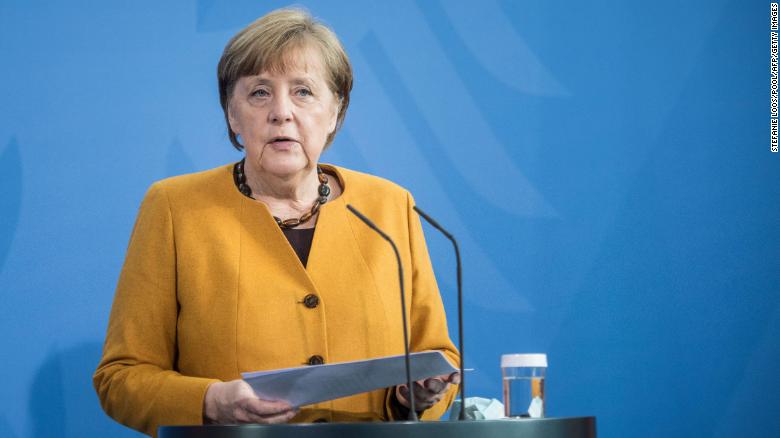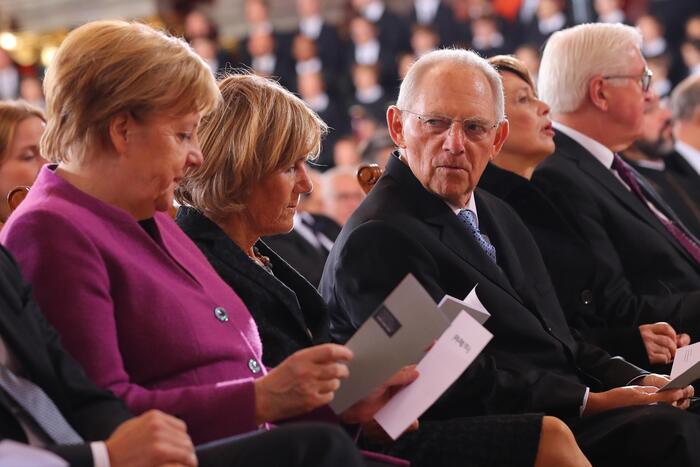Marzipan cookies with Angela Merkel's face 0:47
(CNN) -
Germans will go to the polls next Sunday to participate in an unpredictable federal election, in which for the first time in almost two decades Chancellor Angela Merkel will not be the determining factor.
Merkel has been a symbol of stability in Europe since she took office in 2005;
Chemistry-turned-political pillar has weathered a wave of populism, a financial crisis, a pandemic and Brexit to carve out an impressive legacy as the world's most successful female leader.
Merkel and Biden chart the course of future US-German relations at a White House meeting
But Merkel, 67, will step down once the repercussions of Sunday's vote are clarified, a move that has thrown a sense of uncertainty about these elections.
Compared to the previous polls in 2017 and 2013, there is "a much higher chance of a significant change in German politics and rules after the elections," according to Pepijn Bergsen, a researcher who monitors German politics for the think Chatham House international tank.
advertising
The race to become Merkel's successor is close, and the final winner may not be known until days or even weeks after the polls close.
But for the first time in a generation, the Germans will decide what post-Merkel Germany will be like.
Whoever it is will face a catalog of challenges, both at home and abroad.
What is Merkel's position?
Merkel's departure from the front line of world politics has been long in coming;
He announced it in 2018, when he said he would not run for re-election at the end of his term, following a series of setbacks in regional elections.
During his long time as Chancellor of Germany, he has dealt with five Prime Ministers of the United Kingdom, four Presidents of France, seven Prime Ministers of Italy and four Presidents of the United States.
Her tenure has been highly eventful, and Merkel's unflappable presence throughout has given her an international reputation for stability and good sense.
"That has worked very well for him politically in Germany and on the world stage," Bergsen told CNN.
"Germany has done very well in the last 15 years from an economic point of view ... (and) Germany did not do so badly during the financial crisis, but they have realized that this is not going to last." .
Angela Merkel has been Chancellor of Germany since 2005, but will now leave office.
The European refugee crisis of the mid-2010s posed a major challenge to Merkel's party, the Christian Democratic Union (CDU), and has also drawn naysayers over its close relationship with China.
But after a pandemic in which Germany fared better than many of its neighbors, analysts and polls suggest that Merkel will step down with the respect of most Germans.
"In Germany it is viewed very positively, because it is associated with stability: people know what they are getting," said Ben Schreer, from the Europe office of the International Institute for Strategic Studies (IISS), based in Berlin
Who could replace it?
German politics is dominated by two parties - the center-right CDU and the center-left Social Democratic Party (SPD) - which have ruled together in coalition for the past eight years.
But other parties have gained popularity in the last decade as the CDU and SPD lost ground.
These elections are especially close;
the CDU and SPD have maintained advantages in the polls, and the Green Party has also emerged as a serious contender.
Olaf Scholz, from the Social Democratic Party, is one of the leading candidates to become the new chancellor of Germany.
(Credit: Sean Gallup / Getty Images)
Merkel's successor at the helm of the CDU is Armin Laschet, 60, a longtime ally of the chancellor and deputy leader of the party since 2012. A devout Catholic, whose father was once a coal mining engineer, was selected as a candidate. of the party after a tortuous struggle for leadership.
Laschet has a background in law and journalism, and was elected to the German Bundestag in 1994.
Merkel has voiced her support for Laschet, but despite her efforts to persuade the Germans to stay with the CDU, polls suggest her replacement as party leader is struggling to win over the Germans.
His main opponent is Olaf Scholz of the SPD, who has taken a surprising lead in the polls in recent weeks, leaving him the favorite, by a narrow margin, heading into Sunday's vote.
Like Laschet, Scholz has a long history as a political actor in Germany.
He has been Merkel's finance minister and vice chancellor since 2018, possibly putting him in a better position to run as her natural successor than his own party's candidate.
Armin Laschet, from Merkel's CDU party, is a candidate for succession.
(Credit: Sean Gallup / Getty Images)
Scholz has gained greater visibility by navigating Germany's economic response to the pandemic, and overcame the last electoral hurdle with a confident performance in the latest television debate.
However, polls point to large numbers of undecided voters at the end of the campaign, increasing the unpredictability of the vote.
Green Party leader Annalena Baerbock made a brief sensation in German politics when she rose in polls early in the campaign, prompting voters to wonder if she could become the country's first Green Chancellor.
A 40-year-old professional trampolinist, Baerbock excels in a field of largely male political leaders.
And while his star has faded a bit down the stretch, he has taken advantage of voters' concerns about the weather to establish his group as a third-game career.
The far-right AfD party remains a stubborn presence on the political scene, battling the liberal Free Democratic Party for fourth place.
Annalena Baerbock, leader of the Green Party, is also a candidate to succeed Merkel.
(Credit: Sean Gallup / Getty Images)
The refugee crisis, which brought the AfD into German politics, is no longer a pressing political problem, but the party remains a safety valve for voters angered by immigration issues.
In March, they became the first German party since Nazi times to be watched over by the government.
How does voting work in Germany?
German Bundestag elections are held using a proportional representation system, which means that the percentage of votes of each party is directly related to the number of seats it obtains in Parliament.
This principle makes it practically impossible for a party to lead a government alone;
instead, coalitions must be formed after the vote, and these often contain more than two groups.
Many Germans have already cast their votes;
the pandemic has increased the number of mail-in ballots that took place before voting day.
Regardless of how they decide to vote, Germans must choose their local legislator, and also their preferred party in general.
Once the results come in, a race will begin to gather enough seats to govern, which means that smaller parties can become kingmakers.
Floods devastate communities in Germany 1:38
"Whoever wins on paper Sunday night probably can't be sure that he is actually going to lead the government, because there are going to be a lot of permutations," Schreer explained, adding: "We may not know until November, if we have luck".
Which are the main problems?
All the candidates are caught in a conundrum the size of Merkel as they try to define their own agendas while allaying Germans' fears of a leadership change.
Climate change has been a major factor in the national debate, especially after the devastating floods that hit the country in July.
Merkel's push has placed environmental issues at the center of German politics, and virtually every party has promoted her green credentials.
In this campaign, the Green Party has called for a 70% reduction in greenhouse gas emissions from 1990 levels by 2030, compared to the government's current target of a 55% reduction.
Economic concerns have also come to the fore;
In a last-ditch attempt to address voters, Laschet said on Monday that a left-wing coalition led by the SPD would provoke a "severe economic crisis," Reuters reported.
Laschet has also followed Merkel's line with regard to the European Union;
In the last pre-election debate, he highlighted European cohesion as one of his main policies.
But the campaign has been defined above all by internal affairs;
a rise in the minimum wage and pension reforms are at the core of Scholz's campaign, and he again insisted on those plans in the debate.
Will a Germany without Merkel remain a leader on the world stage?
The global consequences of Sunday's vote are clear;
Merkel's longevity made her Europe's de facto leader, and it is unclear whether her successor will play the same role.
"Germany is going to face some major foreign policy challenges that the new government has to take on," Schreer said.
"The question is who is going to replace her (Merkel), and if that person will have the same charisma and capacity as her," he added.
"The Allies are skeptical, and the Germans are also quite cautious in that regard."
German airbase is used as a refugee camp 2:05
A key part of Merkel's role was her strong determination to maintain European cohesion and to bridge the gaps between EU member states.
"Macron will try to usurp Merkel's position in Europe," Bergsen predicted, pointing to a possible shift in the balance of power toward France, Germany's western neighbor.
"The German position will not necessarily change, but whoever comes to power now will have to deal with a broader (internal) coalition, so it will be somewhat more difficult for him to lead on the international stage."
Looking further afield, Germany's new leader will also have to balance the country's relations with the United States and China, two nations with which Merkel tried to forge close ties.
And keeping the UK close after it leaves the EU is key.
"The UK remains an important partner strategically, and Germany knows that if the UK does not engage with the European continent, then it will divide the Europeans," Schreer said.
"(Germany) is a very respected country on the international scene, that is undoubted," he added.
"The question is: will that now allow Germany to weather those international storms that are undoubtedly coming?"









